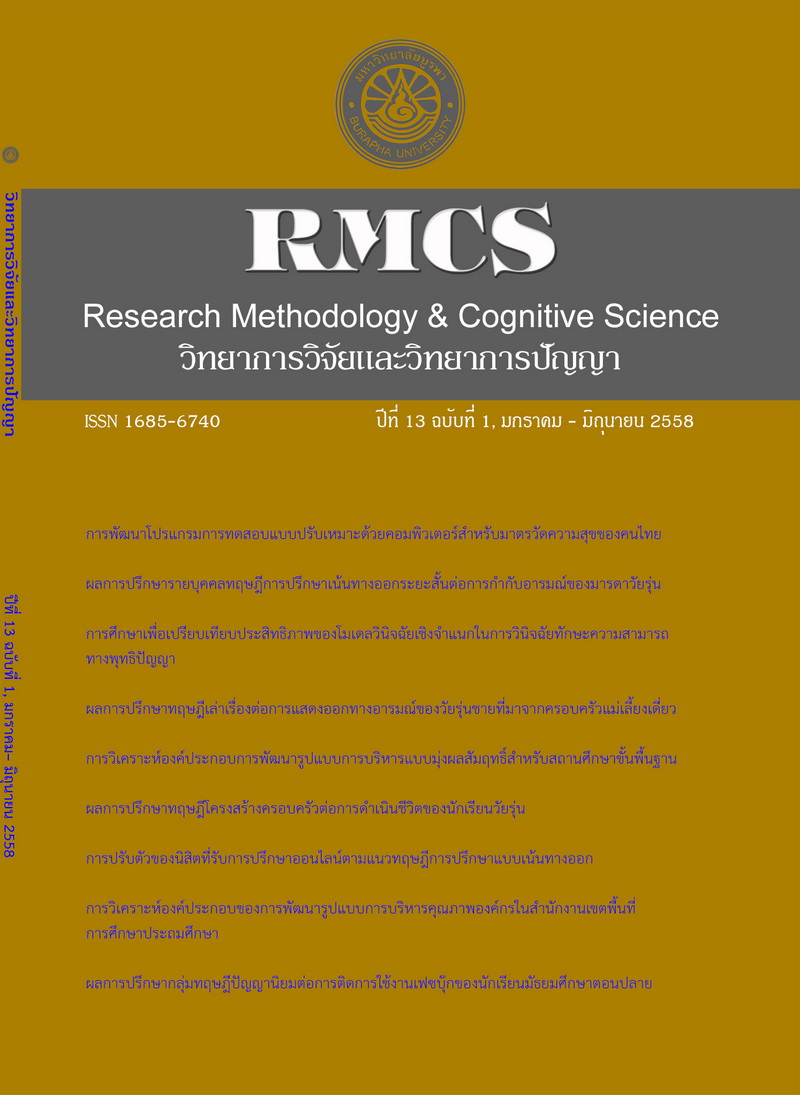การวิเคราะห์องค์ประกอบการพัฒนารูปแบบการบริหาร แบบมุ่งผลสัมฤทธิ์สำหรับสถานศึกษาขั้นพื้นฐาน
Main Article Content
Abstract
การวิจัยนี้มีความมุ่งหมายเพื่อวิเคราะห์องค์ประกอบการพัฒนารูปแบบการบริหารแบบมุ่งผลสัมฤทธิ์ สำหรับสถานศึกษาขั้นพื้นฐาน ระเบียบวิธีวิจัยเป็นการวิจัยเชิงปริมาณ ดำเนินการตามขั้นตอนการวิเคราะห์ องค์ประกอบเชิงสำรวจ (Exploratory Factor Analysis) แบ่งออกเป็น 3 ขั้นตอน ดังนี้ 1) กำหนดกรอบแนวคิด ในการวิจัย โดยศึกษา วิเคราะห์ สังเคราะห์ เอกสารงานวิจัยที่เกี่ยวข้อง 2) ศึกษาองค์ประกอบการพัฒนารูปแบบ การบริหารแบบมุ่งผลสัมฤทธิ์สำหรับสถานศึกษาขั้นพื้นฐาน 3) วิเคราะห์องค์ประกอบการพัฒนารูปแบบการ บริหารแบบมุ่งผลสัมฤทธิ์สำหรับสถานศึกษาขั้นพื้นฐาน กลุ่มตัวอย่างเป็นผู้บริหารสถานศึกษา สังกัดสำนักงาน คณะกรรมการการศึกษาขั้นพื้นฐาน จำนวน 379 คน ได้จากการสุ่มแบบหลายขั้นตอน (Multi-stage Random Sampling) สถิติที่ใช้ในการวิเคราะห์ ได้แก่ ค่าร้อยละ ค่าเฉลี่ย ค่าเบี่ยงเบนมาตรฐาน และการวิเคราะห์ องค์ประกอบเชิงสำรวจ วิธีการสกัดองค์ประกอบและวิธีการหมุนแกนองค์ประกอบ
ผลการวิจัย ปรากฏว่า องค์ประกอบของการพัฒนารูปแบบการบริหารแบบมุ่งผลสัมฤทธิ์สำหรับ สถานศึกษาขั้นพื้นฐาน มี 6 องค์ประกอบ 36 ตัวแปร ดังนี้: องค์ประกอบที่ 1 มาตรฐานด้านคุณภาพผู้เรียน 9 ตัวแปร องค์ประกอบที่ 2 มาตรฐานด้านการบริหารจัดการศึกษา 9 ตัวแปร องค์ประกอบที่ 3 การกำหนด มาตรฐานและจัดทำแผนพัฒนาการศึกษา 8 ตัวแปร องค์ประกอบที่ 4 การดำเนินงานตามแผนพัฒนาคุณภาพ การศึกษาอย่างต่อเนื่อง 5 ตัวแปร องค์ประกอบที่ 5 การติดตามตรวจสอบและพัฒนาคุณภาพอย่างต่อเนื่อง 2 ตัวแปร และองค์ประกอบที่6 การจัดระบบบริหารและสารสนเทศ 3 ตัวแปร
Factor Analysis in Development of Result-Based Management Model for Basic Education Institution
Prapha Smakom
Graduate School, North Bangkok University, Thailand
The purposes of this research were: components analysis for development the model of Result-Based Management for basic educational institutions. The research was consisted of 3 steps as follows: 1) conceptual research framework, 2) study the factor, and 3) factor analysis. The samples used in this research were from 379 educational institution administrators who were selected by the multi-stage random sampling. Statistic used to contents analysis, the percentage, mean, standard deviation and Exploratory Factor Analysis.
The research results were as follows:
The factor of development the model of Result-Based Management for basic educational institutions were 6 factors 36 variables found as follows: Factor 1 quality of learner standard 9 variables, Factor 2 education management standard 9 variables, Factor 3 educational standard and education development plan 7 variables, Factor 4 school education management system 5 variables, Factor 5 quality self assessment for educational standard 2 variables, and Factor 6 education management system and information 3 variables.

